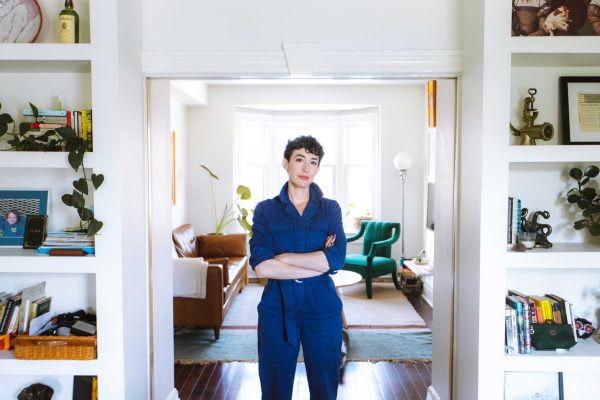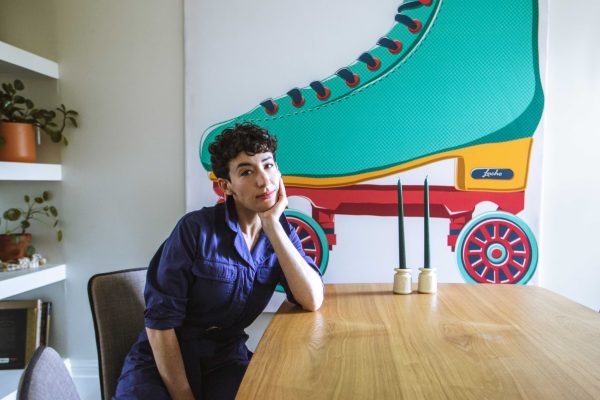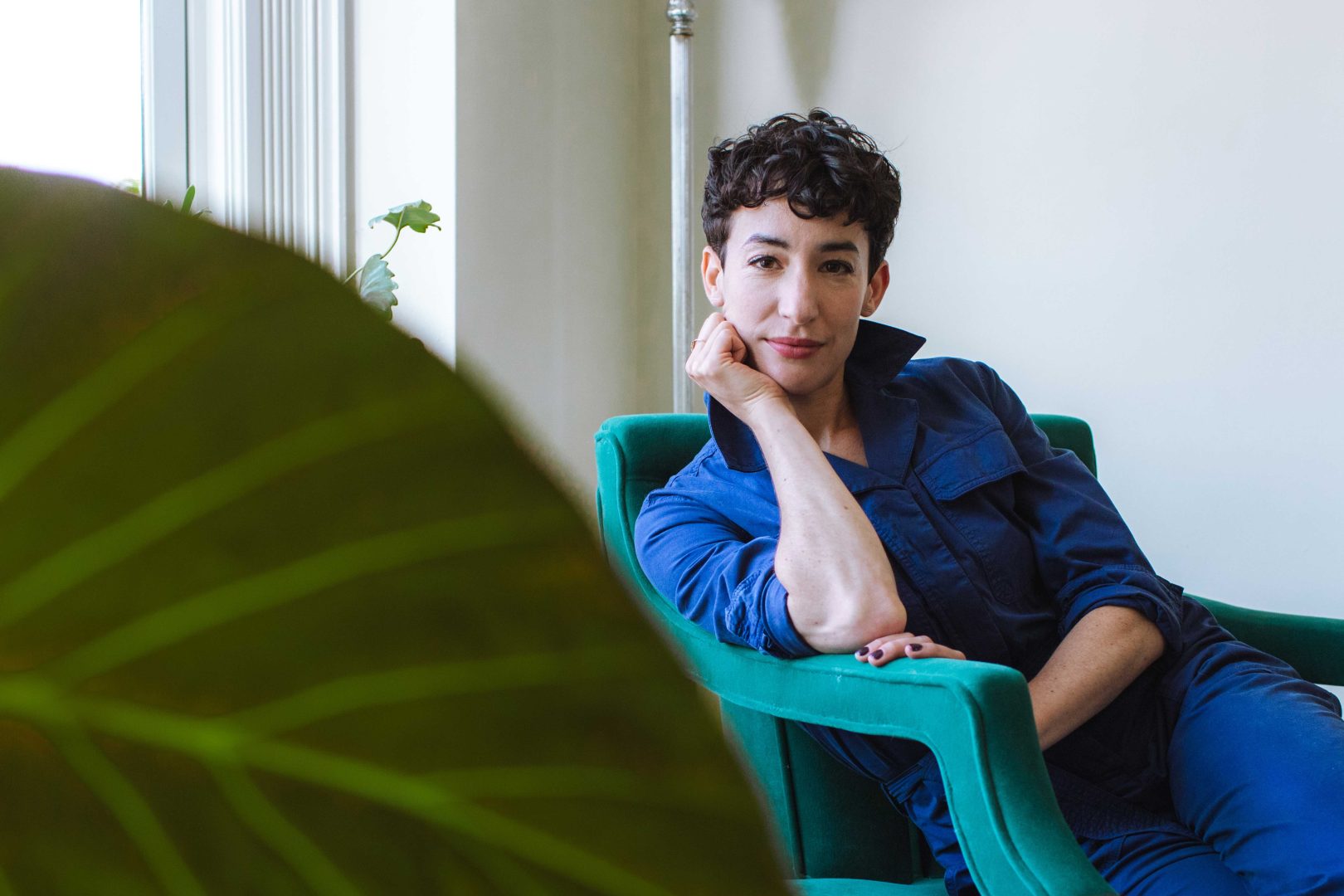By Meghan Yuri Young Photography: Max Powers To reprise her Broadway role in Toronto’s onstage version of Harry Potter, Sara Farb returned to the city that raised her. We took the opportunity to not only…
By NowPlayingToronto
By Meghan Yuri Young
Photography: Max Powers
There’s a fairly good chance that if you met actor and theatre-maker Sara Farb, you wouldn’t guess her profession. Not only is she gentle with a disarming smile, but Sara — who has performed at the Stratford Festival and made her Broadway debut in 2019 — is also extremely shy. And yet, she’s unexpectedly candid as well. It’s only when Sara opens up, and you learn about her extensive theatre experience and enviable resume, that you may start to envision her as, for example, Delphi Diggory in Mirvish’s theatrical production of Harry Potter and the Cursed Child. In fact, it’s this Broadway role Sara reprised in Toronto — the city that raised her, the city to which she returned, and the city that sets the stage for other projects.

Meghan Yuri Young: In preparing for this interview, I learned a lot about your impressive resume and, essentially, professional trajectory. But I couldn’t, for the life of me, find out if you grew up in Toronto.
Sara Farb: I grew up in North York. My childhood was spent, when I was eightish, in a theatre program in Thornhill. The woman who ran it ended up becoming my agent for, like, 12 years. I still have a really great relationship with her. I went to school mostly in Toronto.
MYY: Can you tell us a little bit about yourself and what you do?
SF: Well, I’m Sara and most of my career is centred around performing. I’ve been performing on stage since the age of nine. My first professional gig was here, in Toronto and, through the course of my childhood, I kept that up. I went to Earl Haig Secondary School in the Claude Watson program and became very consumed with the arts in my high school. After that, I decided to get an English degree at UofT as opposed to getting a theatre degree. Honestly, I was pretty arrogant and just kind of assumed I knew everything, which was something that was very quickly shot down.

MYY: How old were you at this time?
SF: Definitely just 18. Thankfully, I don’t regret going in an academic direction because, throughout my university career, I was still performing and acting. But it’s just very obvious that I had an inflated sense of self.
As I was getting a degree, I was sort of learning how to produce small contemporary musical theatre around the city and meeting people who would become lifelong friends — one of whom was [Musical Stage Company founder and former CEO] Mitchell Marcus. He just recently stepped down from The Musical Stage Company. He’s been so instrumental in major events in my career.
At a certain point, I was feeling really discouraged by the potential for myself in the Canadian theatre world. It’s still a very new musical theatre industry. I fell through the cracks of what people were producing and what they wanted. It’s a really insular community. If you didn’t know the right people at the right time, you just were kind of overlooked, which I think still exists, but hopefully, people are improving. That was why I self-produced. It got to a point where I was feeling I might want to look for joy elsewhere. Of course, as soon as I made that decision, it seemed like opportunities just opened up.
MYY: When you stop looking, it finds you…
SF: Exactly. So, by chance, I got a few contracts that led to bigger things. Then, finally, I was hired by the Stratford Festival to be in their classical theatre season, which I thought was such a joke because, if I was ever gonna be hired, I figured it would be for a musical. The musical they were doing was Fiddler on the Roof, and I’m a Jewish person [which the majority of characters are]. When I didn’t get cast, I was like, “Well, I guess I’m never gonna work there.”
Then, a few months later, Stratford hired me to do the Shakespeare play The Merchant of Venice. That began the adult chapter of my career. I spent five years there and intermittently did different contracts. I picked up writing again, which I explored in high school. I started writing in earnest.
MYY: Speaking of full circles, you touched on how, at nine years old, you started in theatre. Specifically, you started with Mirvish — and you came back to Mirvish for Harry Potter and the Cursed Child!
SF: It’s kind of funny; there are two people in the hair department who I worked with back then. I remembered them immediately, and I always recalled being treated so well by those two individuals. Particularly, as an equal instead of being talked down to as a child. Encountering them as a grown-up, and being able to enjoy them very much more as peers, is really, really lovely. I do encounter others who I worked with, who are still in the business, and it’s kind of an unspoken understanding of development. It’s just a really nice thing.
MYY: What’s it like having been in this industry for so long?
SF: A part of me just always wants to apologize about it. It felt like a fluke of my childhood. I was the only person in my family demonstrating sincere interest in the field. I’ve been a Canadian Actors’ Equity member since the age of nine.
There was a lot of pressure that I didn’t acknowledge, that I wasn’t aware of. Thinking about children I’ve worked with, seeing kids in theatre, and remembering the workload I was presented with, I don’t know, it feels separate from my identity now. It obviously shaped me in a much greater way than I’m allowing myself to process.
This return to Mirvish, I guess it was a continuum but it feels a bit separate — especially because the company itself has changed so much since my childhood.
MYY: How has it changed?
SF: Oh, just, like, Ed Mirvish was around. Now, David Mirvish is taking it on … and the company feels like it’s entered this phase that feels separate from when I was experiencing it as a kid.
MYY: You mentioned that the theatre industry here is still young, and you’ve been on Broadway for the same production you’re now in Toronto for, what’s the difference between the two?
SF: For musical theatre, it’s still a newish art form — even in America. But, in Canada, things start small and they grow slowly, whereas in the States, there are resources and space to continually generate and try. Here, it’s a lot of tried-and-true old musicals, things that are popular elsewhere and then trickled down here.
Again, not to speak to programming at all, it’s just that when I was trying to find my way, I didn’t feel seen as a potential part of what the musical lead interest was. What interested me, and what I felt more seen in, were smaller, more intimate stories. That is what Mitchell Marcus really shepherded into the city. It’s now becoming much more commonplace, whether that’s to do with the kind of stories that we’re craving or if it’s budgetary. It could be both. But I think there’s a much greater interest in telling smaller, more personal stories in more interesting ways here, in Canada.

MYY: Shifting the conversation, let’s chat about Harry Potter and the Cursed Child. How did you initially get cast in the Broadway production?
SF: The producers came to Toronto in summer 2018 because one of the producers on the show, Thomas Swayne, is Canadian. He had been working on the show for a while; I think since the original production in England. He was like, “You guys are missing out on a treasure trove of actors who understand repertory theatre.” The Stratford and Shaw festivals do two different plays at the same time, so it’s in our DNA as Canadian stage actors. Not to mention, the calibre of talent and familiarity with dialects.
So, they came — also with an eye to see if there was space for a Canadian production down the line — and auditioned people. Every actor that I know went in for this huge audition call because there are so many parts in the show.
I, embarrassingly, hadn’t read the play. But despite that, thankfully, they invited me to come down for a callback in New York. They were also casting the San Francisco production and anticipating future replacements for Broadway, but I had already committed to the Stratford Festival for the next season. It would’ve been amazing to do the part for the first time in San Francisco, but Stratford took priority and then Broadway took priority over everything.
That opportunity came about a month later. I obviously couldn’t say no. It was a bit bittersweet because I was supposed to be in the final part in Kate Hennig’s incredible Queenmaker trilogy at the Stratford Festival. I [was] in the previous two plays. It’s an incredibly rare thing for a playwright to write with your voice in mind, so it was hard to walk away from that. But it was greeted with respect and understanding and admiration.
A few months later, I was moving to New York and started rehearsal in December of 2018. I did my first performance on Broadway in March of 2019, did the year, and then COVID happened. That said, I was already wrapping up my last performance before the new cast started.
MYY: Was there a sense of déjà vu with the Toronto production?
SF: People have [asked] me if it’s weird, if it’s boring to be doing the same thing. And, quite frankly, it is so thrilling. It feels so fresh because this group of people is exceptional and everyone gets along so unbelievably well. Everyone is just so obviously happy to be there every day. Getting to revisit this thing that I really, really loved doing, I don’t think about it too hard because it’s just so fortunate. There’s been an overflowing of love and support and fortune.
MYY: Also, how could anyone think it would be boring? It’s Harry Potter!
SF: The show really is exceptional. The thrill that is the magic, it really does something to you. It’s gleeful and terrifying and just the best theatre experience I’ve had as an audience member as well.
MYY: Is there anything you’re bringing back from your Broadway experience to the Canadian scene?
SF: First of all, I think that people don’t give Canadian actors enough credit for how good we are — so much so that I don’t think we even give ourselves enough credit!
Seeing other plays on Broadway, there’s a confidence and bombast about performance that serves a purpose. But, when it comes to nuance and awareness, there’s so much there with Canadian actors — whether it’s the training or just the sensibility of being a Canadian person. So, I think there’s a level of honesty and integrity in this group and in this production that I’m hoping to bring along and really live in. I think that is probably what I’m hoping most to send audiences away with.
MYY: What I’ve also gathered from this conversation is that you’ve been very busy. What do you do for fun?
SF: I really like going to the dog bowl in Trinity Bellwoods. I love watching [my dog], Andy, run around, and walking through the park helps me. I listen to audiobooks almost exclusively, so anytime I can do that while I walk is a nice decompression.
MYY: You’re not alone. Nearly every single creative I’ve interviewed says that nature replenishes them.
SF: Yes! I think I’ve also become so used to not being able to go somewhere. So, I’m pretty okay at home. I do really like being surrounded by people, even though I get very anxious if I have to talk. So, if people are talking around me, like at a café, that’s always a pleasant excursion for me.

MYY: You also co-wrote the play KELLY v. KELLY. Tell me about that.
SF: Yes! I wrote with Britta Johnson, who is, in my opinion, the best musical theatre writer in this country. She and I wrote this piece that was supposed to be produced in 2020, and it wasn’t. So, in 2023, it got a production with Musical Stage and Canadian Stage.
It’s based on true events about a young New York socialite in 1915, whose mother had her arrested and brought to trial for going out tango dancing against her wishes. It’s a crazy-weird event in history that I heard about on a podcast, and I thought would be a really good subject for a musical. It’s about intergenerational feminist values and mother and daughter relationships at a very profound moment in history when things started to become a lot looser and suffragettes were becoming louder.
MYY: That sounds really powerful.
SF: We’re really, really proud of it. It was directed by Tracey Flye, who is just an amazing woman. There’s so much dance in it, obviously, since tango is such a huge part of the story.
Beyond Harry Potter and the Cursed Child, Mirvish has plenty of stage productions on offer. There are also an abundant amount of magic happening on stages all over Toronto.

